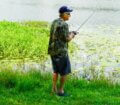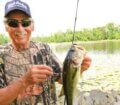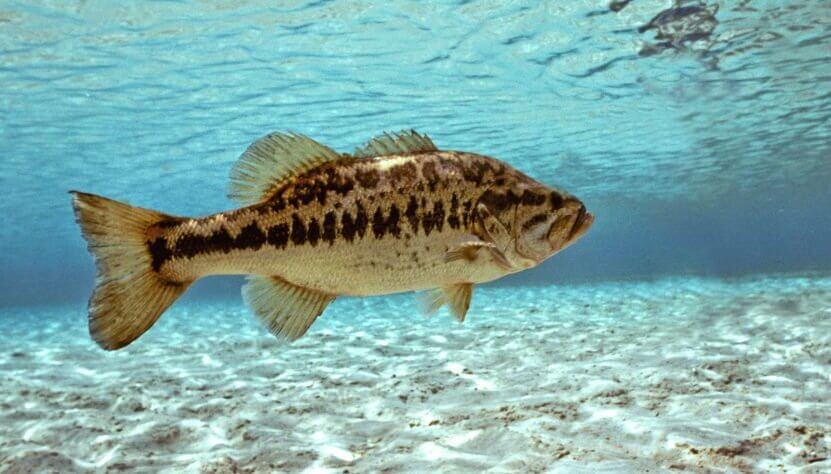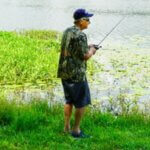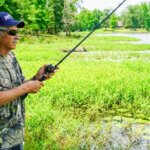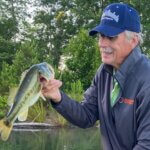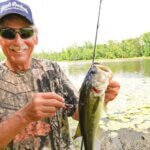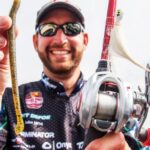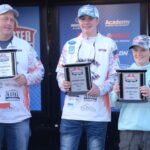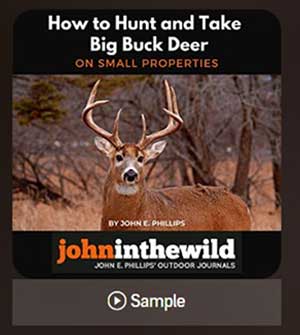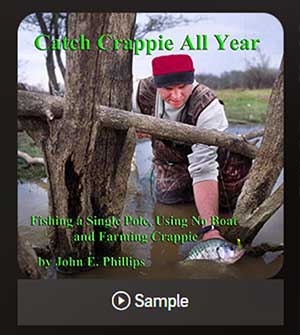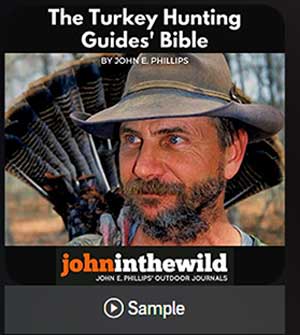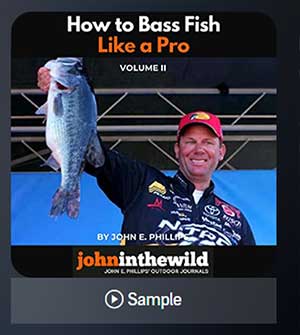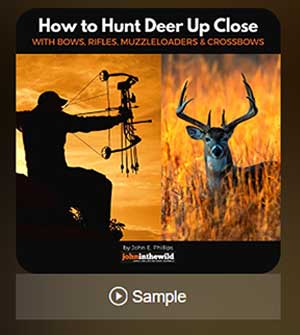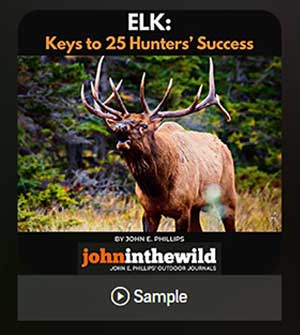Editor’s Note: South Carolina’s Hank Parker won two Bassmaster Classics before he moved into hosting and producing his TV shows, “Hank Parker’s Outdoor Magazine” and “On the Water with Hank Parker.” Parker manages the ponds on his farm intensively for bass and fishes them regularly. He films TV shows each year on his friends’ and neighbors’ farm ponds, gaining experience in farm-pond management and catching bass from farm ponds. He says, “Each farm pond is different and isn’t created or maintained in the same way. The history of the pond itself and the type of pond it is impacts how, where and when you’ll catch bass there. A friend has nine farm ponds – each with its own personality. I’ll fish different lures in each lake for bass. One of the ponds remains muddy almost all year, while another is crystal clear with little structure in it. Yet another pond homes plenty of structure. The clarity of the water, the type of pond and the kind of pond structure all play very-important roles in your lure selection and your bass-fishing success.”
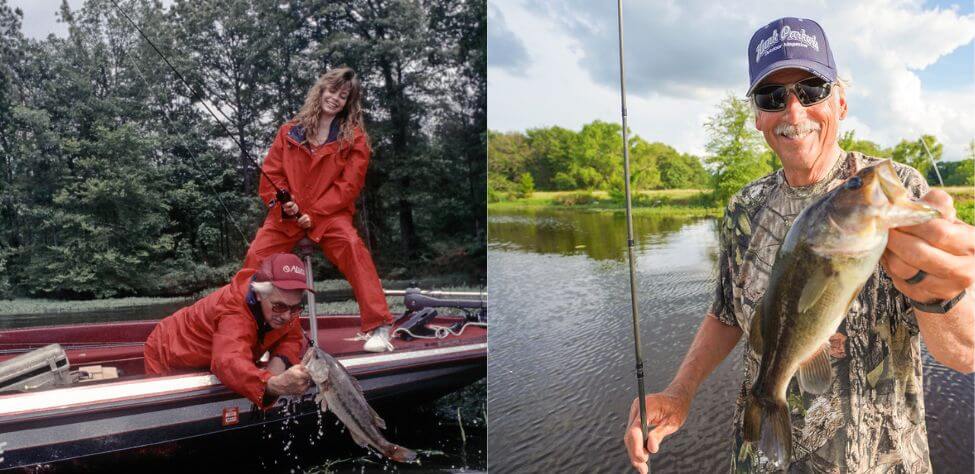
Any Farm Pond After a Major Rain Event:
The secret to catching bass under rainy conditions is to pinpoint where on the shoreline rainwater’s running into a pond to locate holding bass. Rainwater will wash bait like worms and insects into a pond, presenting a smorgasbord of bass food. Many anglers may not want to fish where mud’s coming into a pond, but that’s where bass can pinpoint easy, diverse meals. You may catch several bass from one run-off.
If the water’s running in at the bottom of the lake, I’ll select a lure I can fish on or close to the bottom. If that lake bottom is soft due to run-off water that’s brought in siltation, I’ll fish a lure that remains off the bottom where more than likely the bass will suspend. I like the General or a Senko-type worm because they’re slow-sinking and will cause the bass to attack the lure higher in the water column.
Consider too fishing brightly-colored lures, like chartreuse General worms or white jigs, deliberately and slowly. Color selection is very important after a rain. If I’m fishing a slow-sinking worm, I’ll choose black when the water’s chocolate-milk or iced-tea colored. If bright red water’s coming into a lake, I’ll pick a chartreuse-colored lure. I rarely ever use a topwater lure when I’m fishing a muddy farm pond run-off, although I may fish a frog-type lure. A heavier rain may wash frogs into a farm pond. Remember, when fishing a farm pond, you always can develop a game plan to help you catch more bass.
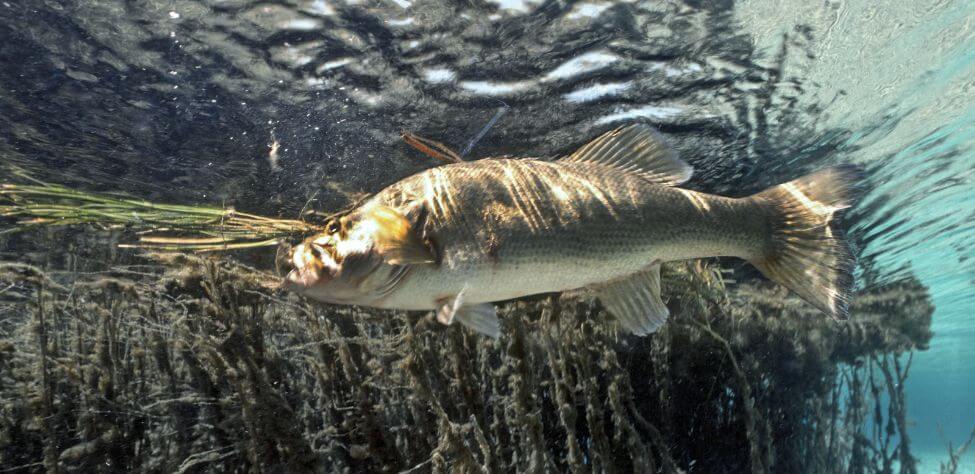
Mystery Farm Ponds for Bass:
You may be invited to fish a friend’s farm pond without knowing the type of pond, the color of the water or the kind of structure in or around the pond. The lures I feel I catch the most bass on – regardless of water, weather, wind or pond type – are: a Jerk Shad; a small topwater popper; a rubber frog; and/or a General in a variety of colors. Sometimes I’ll rig the General whacky-style and use a smaller hook than if I’m fishing a slow-sinking worm Texas-rigged with several various kinds of hooks.
I’ll always have a medium-heavy-action rod spooled with 10-pound-fluorocarbon line with me. I know the line won’t be appropriate when fishing grass or moss, however, I’ve found Berkley’s 100% fluorocarbon tough and strong. Lines available today are far better than they were when I competed in bass tournaments. Today’s 10-pound fluorocarbon has the strength of the 14-pound monofilament I once fished in tournaments. Fluorocarbon has changed the way I fish, due to its neutral buoyancy, meaning I can fish neutral buoyancy lures, surface lures and deep-diving lures successfully for bass.
Tomorrow: Hank Parker Grows Big Farm Pond Bass
Expert Guidebooks on Bass Fishing: Best Sellers

If you want to become the best you can be, find someone who’s already become the best at what you want to do and follow his or her instructions. This is what I’ve done in my new book, Bass Pros’ Season by Season Tactics.
In this book, I’ve chosen some of the best bass fishermen to give you advice on how to find and catch bass during each period of a bass fish’s life, including professionals like Kevin VanDam, Denny Brauer, David Fritts, Rick Clunn, Larry Nixon, George Cochran, Mark Davis, Woo Daves, Gary Klein, Davy Hite, Michael Iaconelli, Skeet Reese, Mark Rose, and Shaw Grigsby.
My hope is that this book will help you find and catch more bass at every time of the year and each day you’re on the water. The men included in this book are some of the best mentors I know of for successful bass fishing anywhere in the nation.
VERSIONS: AUDIBLE & PRINT
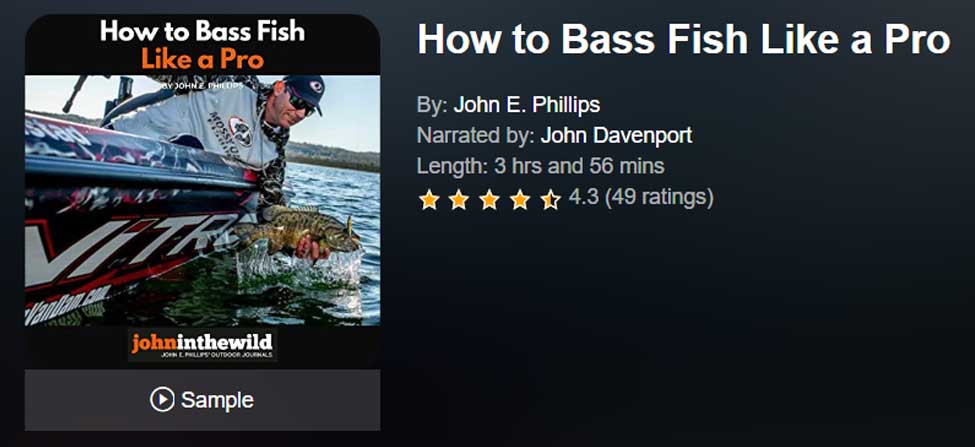
How to Bass Fish Like a Pro
If you could sit down and interview some of the best pro bass fishermen in the world, what would you want them to tell you to help you improve your bass fishing skills?
In this book, How to Bass Fish Like a Pro, Kevin VanDam explains how he catches bass consistently, and how he fishes all 12 months of the year. In the bonus chapters, he will tell you how to fish for hot-weather bass.
Denny Brauer will tell you the ways he hates to fish, how he picks the best fishing lures for different water and weather conditions, and will give you his best fishing tips for hot weather. In Brauer’s bonus chapters, he’ll teach you when to flip a jig, a tube, or a creature bait and tell you his three tips for how to be a better fisherman.
Mark Davis, in Chapter 3 of the book, explains his five secrets to becoming a better bass fisherman, how to turn your bass fishing around to the positive side, and how to catch hot-weather bass. In the bonus chapter, you’ll get six different interviews with Davis, where he tells you: three tips for becoming a better bass fisherman; his three favorite bass lures; and how to keep a big bass on the line and get it to the boat.
James Niggemeyer tells you how to become a bass pro. He also tells you how to catch bass when the weather sizzles. In Niggemeyer’s bonus chapter, he explains how to move from being a bass-club fisherman up to being a pro.
Mark Rose will explain his five favorite go-to bass lures, and how to catch bass in the middle of the summer.
In this book, you’ll hear from top-performing pro fishermen about how they catch big bass consistently, and what they do to win millions of dollars as professional bass fishermen.
VERSIONS: AUDIBLE, KINDLE & PRINT
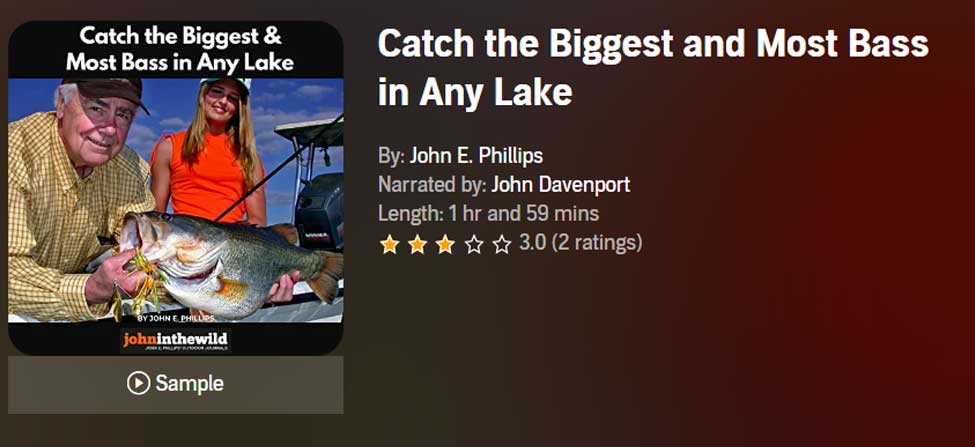
Catch the Biggest and Most Bass in Any Lake
If you were having open-heart surgery at the hospital, you’d want the best doctor with the most experience and the latest equipment and techniques that money could buy to do your operation. You’d study these doctors’ credentials to learn who was the best.
This is the same type of research that author John E. Phillips has done with the best bass fishermen in the nation to solve the problem of how to find and catch the biggest and the most bass in any body of water that he fishes.
This is the same type of research that author John E. Phillips has done with the best bass fishermen in the nation to solve the problem of how to find and catch the biggest and the most bass in any body of water that he fishes.
In this book, you’ll hear about the techniques, tips, baits, lures, and tackle that 18 of the nation’s best professional fishermen use to support their families by winning bass tournaments and catching the most and the biggest bass they can in every tournament they fish.
Most of these anglers are Bassmaster Classic winners, Megabucks winners, Angler-of-the-Year and FLW Tour winners – like Rick Clunn, Kevin VanDam, George Cochran, Mark Davis, Paul Elias, Skeet Reese, Larry Nixon, Hank Parker, Ken Cook, Denny Brauer, Alton Jones, and Jay Yelas.
Also, every serious bass fisherman should know Timmy Horton, Mark Rose, Randy Dearman, Harold Allen, Mike Wurm, and Shaw Grigsby, men whose tactics you’ll find in this book. To learn how to fish for bass and change your bass-fishing trips from fishing trips to catching trips, this book is a must-have.
VERSIONS: AUDIBLE, KINDLE & PRINT
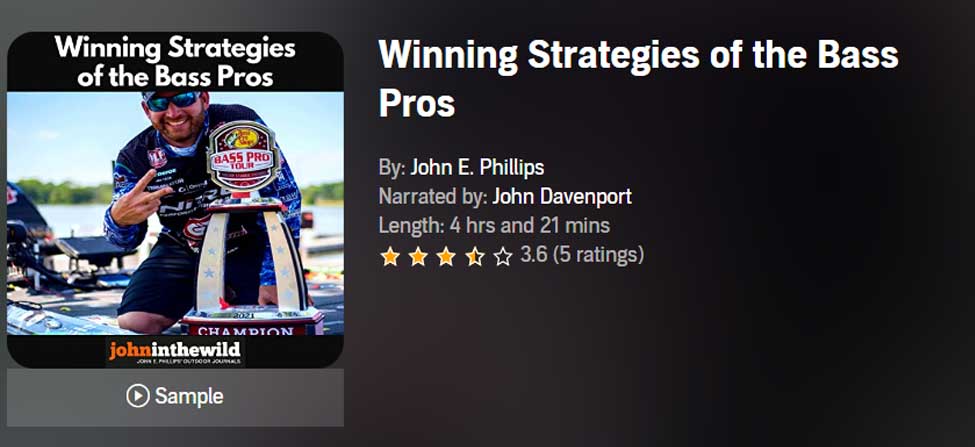
Winning Strategies of the Bass Pros
I learned many years ago if you want to be the best you can be, then you need to learn from the best – particularly when you want to be the best bass fisherman possible. That’s why I’ve written Winning Strategies of the Bass Pros about 11 top bassers.
If you’re wondering at what age you can start learning about bass fishing, you’ll see in the first two chapters about two young men who have come up through the ranks of collegiate bass tournaments – Jordan Lee, who won the Bassmaster Classic in 2017, and Dustin Connell, who won $100,000 in a B.A.S.S. Elite Series tournament in Mississippi in 2017. Top-name pros on both the B.A.S.S. circuit and the FLW circuit are in this book, including Kevin VanDam, Jay Yelas, George Cochran, Rick Clunn, Larry Nixon, Woo Daves, Randy Howell, Scott Canterbury, and Gary Klein.
VERSIONS: AUDIBLE, KINDLE & PRINT
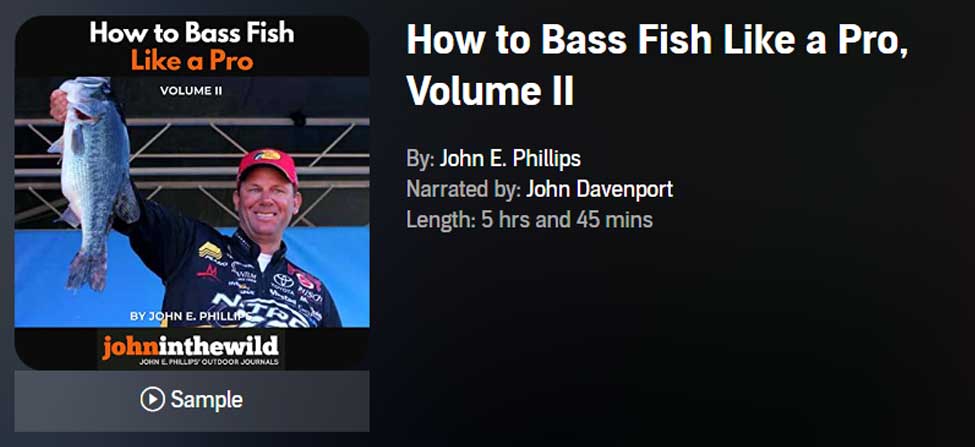
In How to Bass Fish Like a Pro, Volume II, you’ll learn tips and tactics from 21+ Bassmaster Classic winners, two Major League Fishing champions, and 20+ Bassmaster Anglers of the Year about some of the dramatic changes in bass fishing, like:
Depth Finders: You need the latest and greatest depth finders available, since they’re the brains of a bass boat with maps, GPS, side scanning, down scanning, and forward scanning features that enable you to see underwater structures and fish 100-feet away with a 360-degree view. Today’s competitive bass anglers may have four or five depth finders located on the consoles and the bows of their boats.
Other Changes in Equipment: Power fishing for bass using heavy line and rods, big baits, and bait-casting reels that resemble winches have given way to finesse fishing and new techniques like fishing the Ned Rig, the Neko Rig, the Chicken Rig, and the Tokyo Rig on spinning tackle and line as small as 6-10 pounds.
The Growth in Youth and College Competitions for Bass: A young person can begin competition fishing as early as the second grade and continue throughout high school. After that, if the competitor qualifies, he/she may win a scholarship to fish on a college team that eventually may lead them to a professional bass-fishing career.
Changes in the Ways Anglers Bass Fish: Many of the most-consistent winners never pick-up their rods to fish during pre-fishing. Instead, they’ll idle across the water, dropping waypoints from their electronics in places where they’ve identified schools of bass holding. These contestants will have at least 50-250 locations, where they’ve pinpointed schools of bass before a tournament starts.
VERSIONS: AUDIBLE, KINDLE & PRINT

